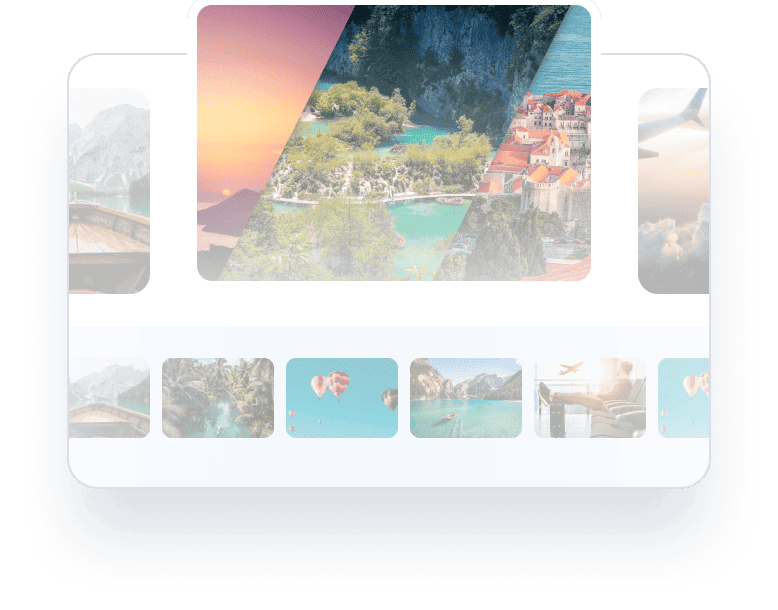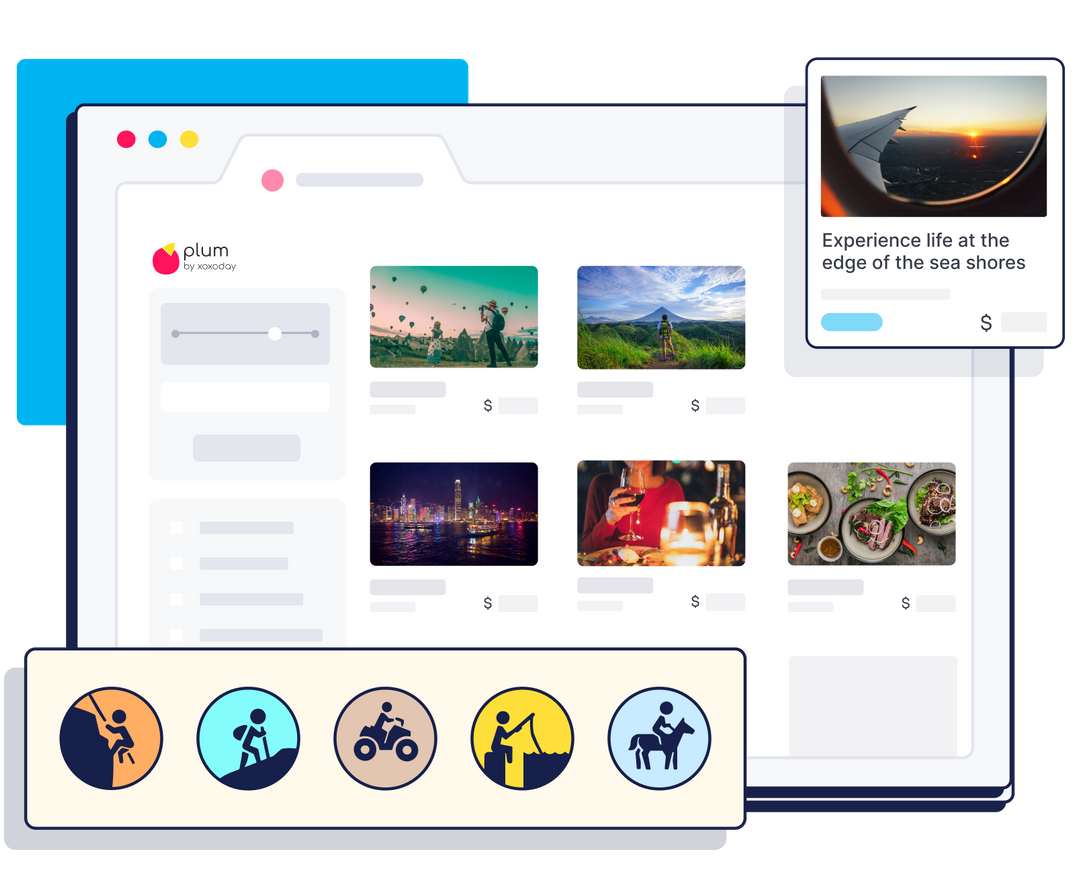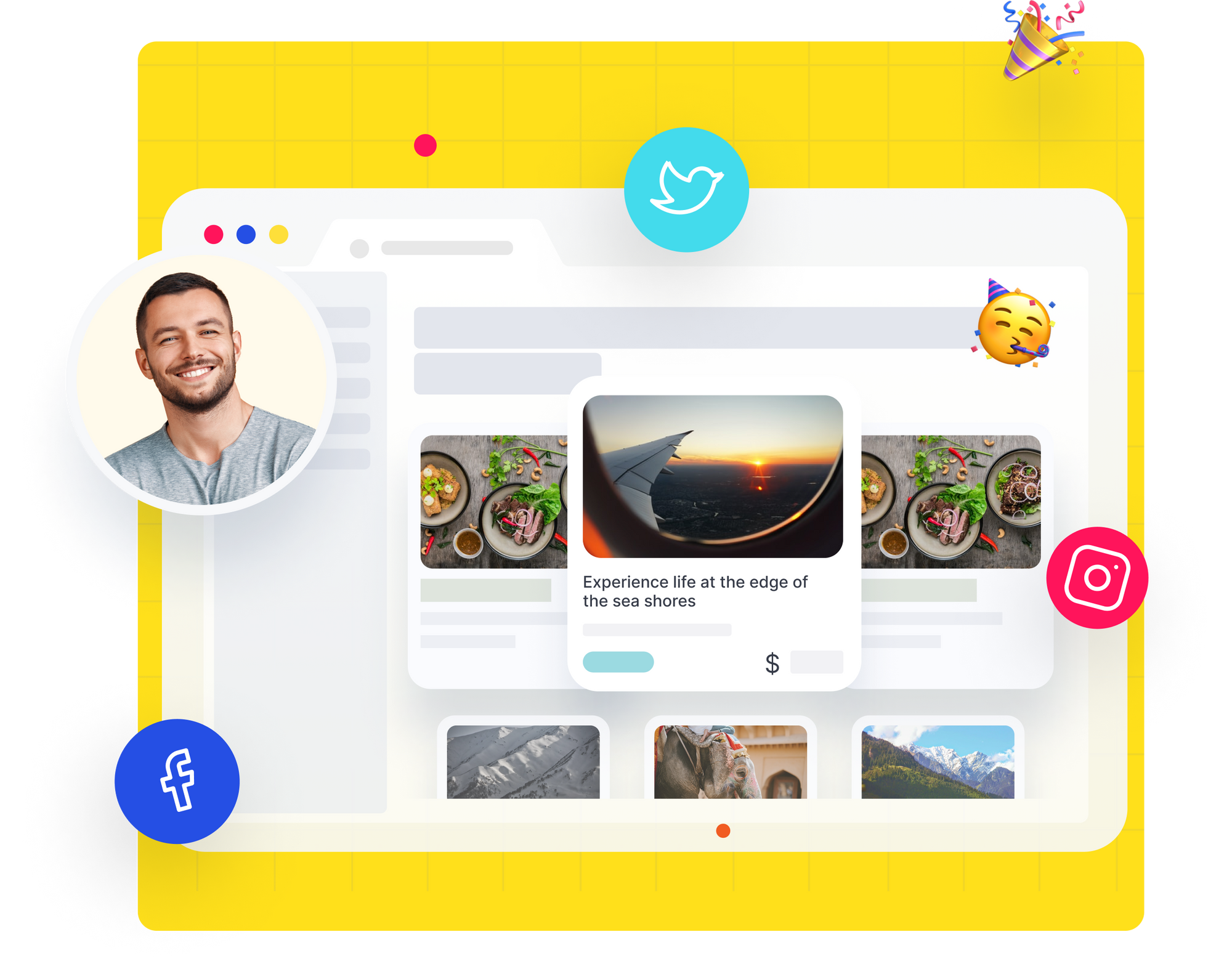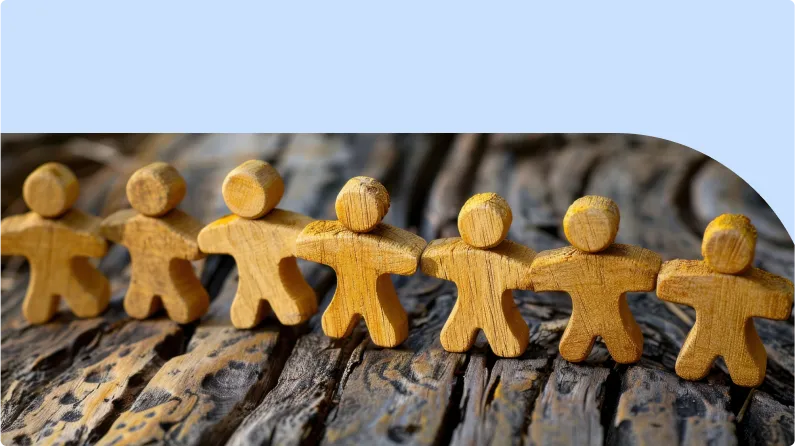Experiential Rewards & Incentives: A Catalyst for Stronger Relationships
Explore this ultimate guide to unravel the tips and tricks on how to make the most out of your experiential gifts. Whether you're looking for the best gifts experience for your employees, colleagues, or partners, we got you covered.
On this page
According to research done by Capgemini, 97% of reward programs rely only on transactional rewards, and 44% of shoppers feel like those rewards are irrelevant. Not all rewards are equally effective, and experiential rewards come out as winners.
Believe it or not, reward programs designed around experiences are the most successful. The science behind it is relatively simple. Let’s understand.
Happiness is neither sold in jars across the counter nor can it be bought with money. But money can buy experiences that make memories, leading to joy and contentment. And that’s pretty much the same thing. No?
Well, the relationship between wealth and happiness has been a subject of study. Research has shown that experiential purchases, such as vacations, concerts, and dinners, bring consumers more enduring joy than material purchases, such as high-end clothing, jewelry, or electronic gadgets.
🤔 Answer this question: Why does a picnic on a sunny winter afternoon with your family or friends bring you more joy than buying a latest season Zara shirt?
Statistics show that 78% of millennials prefer to spend money on a desirable experience over something materialistic. The statistics also show that consumers paid around $1 Trillion for these experiences.
While it is easier to track millennials to record statistics, this trend extends beyond just young people to every age bracket and socioeconomic class. These numbers indicate that people prefer experiential rewards over traditional incentives.
What are Experiential Rewards
The key objective of offering experiential incentives is to exceed an individual’s expectations. It provides them with access to experiences that cannot be replicated or found elsewhere.
Experiential rewards are a way of rewarding good work or recognizing loyalty by gifting experiences. Experiential rewards help establish an emotional connection with the receiver (employees, sales teams, channel partners, or customers). This emotional connection works as a binding force between them and the brand.
When people are in solid relationships, they tend to go out of their way to help each other. Experiential rewards contribute hugely towards strengthening relationships. Hence, experiential rewards can go a long way to help you orchestrate the behaviors of your employees, sales team, channel partners, and customers alike.
Why are Experiential Rewards a Winner
While gift cards, coupons, and discounts are the easy way out, they fail to convey the giver's thoughtfulness at times. 97% of reward programs rely only on transactional rewards. 44% of shoppers feel like those rewards were irrelevant and made them unhappy with these programs. So, it's evident that not all rewards are equal.
Personalized and meaningful rewards result in increased efficacy. While rewards can be categorized into different types, research shows that experiential rewards have the highest effectiveness.
Even though experiential rewards are fleeting, they deliver more long-lasting happiness than material things. And even though things may last more than experiences, the memories that linger after an experience are greater happiness-givers than 'things.'

With a myriad of options at the disposal of the receiver (employees, customers, and channel partners), experiential incentives are an excellent way to differentiate your brand.
Let's take the employer-employee scenario as an example.
- 👉 Employer 'A' gifted a newborn photoshoot to an employee who recently became a parent.
- 👉 Employer 'B' just sent a congratulatory message with a box of sweets.
Between the two, who do you think managed to differentiate himself? The answer is obvious. It is Employer 'A.' The reason?
The sensory involvement is much more significant when the photoshoot happens. This leads to more emotional evocativeness. In response, the employee feels cared for by the employer 'A.' The employee also cherishes and experiences the gift multiple times:
- First, when someone from the human resources department breaks to him about the photoshoot.
- The second when the photoshoot happens
- Then, every time he goes through those photoshoot pictures, he feels good about the employer 'A'
With multiple touchpoints, the remembrance of a gift is bound to stay longer in the employee's memory. Hence, experiential gifts are a winner in every way!
7 Reasons Experiential Rewarding Trumps Traditional Incentives

1. Experiential rewards are more personal
Traditionally, loyalty programs offer money-back and discounts. Customers can easily see the value and may feel rewarded by spending more to accumulate rewards faster, but they do not feel special.
There's no consideration for the customer's unique characteristics in these simple transactional rewards. A gift of experience, such as customized merchandise or tickets to events or activities tailored to the customer's interests, demonstrates the value of the customer and fosters mutual appreciation.
2. Experiential rewards are emotionally evocative
“The relationship improvements that recipients derive from experiential gifts stem from the emotion that is evoked when these gifts are consumed, not when the gifts are received.”
(Source: Sciencedaily)
So, adding experiential rewards into a reward program lends an air of deeper penetration into the minds of the receiver. For instance, experiences like scuba diving, snorkeling, and rappelling give an adrenaline rush.
Meditation camps or yoga retreats have a tranquilizing effect on the receiver. Zumba sessions, gym subscriptions, and wellness programs make the receiver feel cared for. While the receiver is experiencing any such things, the brain chemistry creates wonders.
To understand the connection, let's know our brain's anatomy. The human brain has four happiness hormones which are triggered when we experience something good:
- Dopamine: Released from the reward and pleasure centers of the brain
- Oxytocin: Released when people bond socially
- Serotonin: A mood regulator increased with positive engagement and experiences
- Endorphins: Released when performing a physical activity that can lead to a feeling of euphoria

Experiences have the power to activate all of these hormones. So by contributing to people’s happiness, experiential rewards can amplify productivity and, consequently, profits. So, experiential rewards are more effective because they trigger an emotional response instead of a cognitive response that monetary rewards trigger.
Still, it is essential to understand what makes the receiver happy to derive the full power of an experiential reward program.
3. Experiential rewards are a social experience
People enjoy talking about experiential rewards in a way that would be inappropriate for traditional or cash incentives. It's socially unacceptable to brag about a bonus or commission, a raise or incentive.
Still, it's acceptable to talk about how your hard work gave you and your family a holiday in the Bahamas. Experiential prizes provide a tangible symbol of achievement, with bragging rights attached.
4. Experiential rewards have enhanced value
Experiential rewards can enhance people's perception of their value when adequately presented. Perceived value is higher because the participant's mental image of the award substitutes for its actual value. For instance, a 3D2N vacation always wins over a bonus of 5000 USD. The break from routine would feel much more significant than just the sum of numbers in the salary account. The receiver might not even remember where he spent that 5000 USD. Was it spent on paying bills/utilities or a savings fund? Hence the perceived value is much higher in the case of vacation as a reward.
5. Experiential rewards are non-transactional
Any cash incentive or traditional reward bears a transactional nature. Due to this, they remove the element of recognition that is so essential in a reward. Non-cash awards deliver more recognition because they are distinct from compensation.
Cash or any monetary reward has a way of intermingling with expected remuneration and loses its nature as a reward. Money creates entitlement — you can give it, but you cannot take it away. It is possible to switch off non-cash awards without affecting entitlements.
6. Experiential rewards create longer-lasting impressions
Loyalty programs are a powerful marketing tool whose primary goal is to make a lasting brand impression. People are less likely to recall the discount they claimed using loyalty points. However, they are more likely to remember an experience that the brand gifts them.
For instance, the receiver shall remember a makeover session even after the session with the pictures captured after the makeover. Hence, the experiential rewards are more memorable.
7. Experiential rewards help increase the longevity of a reward program
Since experiential rewards are not overtly measurable, they can be more flexible for budgets. The perceived value of a hot air balloon ride, for instance, is a lot more than a $500 cheque. And a hot air balloon ride is going to cost the company less. Lower investments for higher results are the stuff dreams are made of, right? So why not dream loyalty programs?

Give Memorable Experiences, Not Things.
Curate and send some attractive experiential rewards that your recipients can't stop raving about. From traditional sightseeing tours to a breathtaking 'once-in-a-lifetime' experience, Plum has one of the most diverse selections of reward experiences and activities for you to pick from.
Big Brands and Experiential Rewards: How they Aced it
In 2004, Google started a program called Founders’ Awards. Under the program, they rolled out large stock awards to high-performing employees. These rewards amounted to $12 million (2004) and $45 million(2005).
Individuals sometimes even scored a $1 million reward. After running this program for a couple of years, when Google ran an employee survey, they found their employees were less happy than they believed they would be.
Monetary, measurable rewards became points of comparison and caused friction and jealousy instead of promoting healthy competition. Even those who won these rewards weren’t happy many times.
So, the monetary reward program was phased out and replaced with an experiential rewards program - dinners out, new gadgets, trips to Hawaii. Needless to say, employees were happier and felt these rewards were more thoughtful than monetary rewards.
Like Google, some more large corporations (early adopters) have recognized the power of experiential rewards and used them to good effect. Read on to find out who used them and how.
1. Sephora
The make-up brand allows its customers to choose how they want to use their reward points under their loyalty program - Beauty Insider. Among the transactional rewards, they offer experiences such as exclusive events, free makeovers, early access to new products, find a place. The program has over 25 million members who make up 80% of Sephora’s sales.
2. Sugarfina
Sugarfina provides unique benefits to loyal customers while staying on brand. Candy of the month, exclusive events, and in-store parties are a few “sweet rewards” they offer.
3. Hugo Boss
The Hugo Boss loyalty program, Hugo Boss Experience, provides luxury experiences in line with its branding and ethos. Rewards include complimentary alterations and monogramming, private styling appointments, VIP events, and Uber door-to-door deliveries.
4. The North Face
The North Face loyalty program suits the sporty, adventurous persona. With the XLPR Pass, members only get access to exclusive gifts and rewards in exchange for points accumulated after every purchase made (and for other things, too - like attending events and checking in to certain places!). The experiential rewards they roll out include
- Early access to limited edition collections
- Opportunities to ‘wear and test’ products before they roll them out into the market
- Exciting travel experiences like treks to the Himalayas deliver experiences that match the ethos of the brand
5. Kimpton Hotels
Kimpton Hotels’ rewards program offers all members opportunities to earn Kimpton karma by staying or dining at their hotels, and interacting with Kimpton on social media. Perks range from free Wi-Fi, bar credits, and free nights to more experiential benefits like priority reservations, a dedicated reservation line, and even access to the CEO.
6. MasterCard
MasterCard’s loyalty program, ‘Priceless Experiences,’ aims to connect cardholders to exclusive “money-can’t-buy” experiences. While pre-pandemic experiences included private concerts, celebrity interactions, and trips to high-end restaurants, Mastercard pivoted to bring in the digital experiences for their clients.
7. Marriott Bonvoy
Marriott Bonvoy’s program is called Marriott Bonvoy Moments. It curates extraordinary experiences matched to members’ interests in the arts, cuisine, entertainment, and sports. Points are redeemable for adventures and experiences around the globe. Mariott’s partner choices are quite strategic and global.
8. Lincoln
Lincoln, the luxury vehicle manufacturer, provides Lincoln Access Rewards members with unique physical and virtual experiences tailored around a luxury lifestyle, with complete freedom of choice.
Rewards choices spread over different customer passions, including travel, cuisine, music, and health and wellness. Top-tier members can redeem for “pursue your passions” hyper-personalized experiences in 30 U.S. cities via personal concierges.
When Should You Gift Experiences and to Whom
Experiences are gift-able to employees, channel partners, sales teams, and customers. Here are some cases where experiential rewards can be instrumental in orchestrating the behaviors of recipients:
An Idea Repository: What Experiential Rewards to Give
Gifting is an art, and it’s not always easy to choose the right gift. We feel you. So, to make your life a little easier here’s a ready reckoner to help you solve the gift-choosing conundrum.
Only by giving are you able to receive more than you already have. — Jim Rohn
Experiential reward options as per persona
1. For the newly-Weds
A newlywed employee would love a romantic dinner at a high-end restaurant with their spouse as a reward for all the hard work put in at the office or booking an entire theater for a newlywed channel partner to have a romantic movie and dinner night out. The spouse wouldn’t mind the extra hours either, if it meant a memorable experience like this in return, no?
2. For mothers
Working mothers have no choice but to spend time away from their children. Recognizing and acknowledging the need for mother-child time is highly thoughtful. Hence a mother and child camping experience as a reward will make the mother feel rejuvenated and grateful.
3. For sports fans
For people who love sports but are stuck in the office all week–a weekend playing outdoor sport would be the best kind of energy top-up one can offer. How about the gift of Soap Football where they can let themselves be children again, or a golf lesson for those enthusiasts.
4. For the adrenaline junkie
From scuba diving and water sports to bungee jumping, horse riding, and learning to play golf or from camping amongst nature to a paramotoring flight or enjoying the sunrise from a hot air balloon - gift your recipient the experience of a lifetime.
Experiential reward options as per geography
From rappelling in Rishikesh to snorkeling in Krabi, there are insane options you can give your employees as experiential gifts. These are in no way an exhaustive list, just a little teaser to get your creative juices flowing.
1. India
From dinners to tarot card readings, horse riding to segway tours, snowmobiling in Gulmarg to treks in the Himalayas, northern India is full of such lovely experiences. There are plenty of fun and adventurous things to do in South India! From snorkeling in the Bay of Bengal to a fun, puzzling challenge of escaping the room in Bengaluru to paintball games to river rafting and off-roading.
2. The USA
How about the experience of watching the sunrise from a hot air balloon? Or a food tour for that employee who loves a good bite, or an experience of the best pub in town for that client you know enjoys a slight loosening up. Or a celebrity Home tour on Beverly Hills for that star-struck newbie, maybe?
3. Thailand
From cruises to dinner in the dark, pub crawls to sightseeing tours, there’s something for everyone. So why not gift your top-performing employees a 3-day tour to Thailand?
4. United Kingdom
A tour of the Warner Bros. Studio may sound like stuff dreams are made of. But it’s an experience that you can give someone. A traditional British tea experience or tours of Oxford City. A chance to experience the lands that one reads about in books and sees in films.
5. Spain
The capital of Flamenco! Give the gift of dance lessons and good food. Instill memories that they can remember for a lifetime. In Spain, find experiences that guarantee to put a smile on the receiver’s face. Cooking classes, dance lessons, food tours, and guided tours of the city - it’s all here for you to choose from.
6. UAE
A day at a water theme park is a fun and thoughtful gift for an employee who has worked hard throughout the month or a quarter in accomplishing incredible results for your business. For those with kids, passes to the ice skating rink or a banana boat ride sound like an absolute riot! Think of the memories they’ll make and all the splashy photos in the desert heat. Things they’ll thank you for again and again.
Experiential reward options as per vacation
1. A cruise trip
Going on a cruise is something everyone wants to add to their bucket list or tick off from their holiday checklist. Let your employees immerse themselves in the surroundings while taking a cruise with their loved ones. It could be taking a cruise on a party boat in Goa, sailing on a sailboat in Mumbai (as they catch the sun setting on the skyline), or stepping aboard a cruise ship in the Andaman Islands to embark on a historical journey.
2. Cycling trips
A bicycle trip or tour is the best way to explore the nature trails, the rich cultural heritage, and the significant landmarks of a city. Gift this experience to all those who look towards taking the off-beat path to do something unique.
3. Homestay vacations
Thank your employees or clients by gifting them a weekend getaway to a beautiful homestay in picturesque surroundings, away from the hustle and bustle of daily lives. Let your employees return to work refreshed and energized. Some homestay options include staying in a French villa or amidst a tea estate, or by the lake.
Experiential reward options as per numbers
1. For families and groups
Let your recipient take a break by taking a day trip with their friends and family. Choose the desired experience gift regardless of which city the recipient is in. Choose a day trip to see the Taj Mahal in Agra or the Hawa Mahal in Jaipur. Let your employees come back to work relaxed and refreshed.
2. For individuals
Gifting a spa experience is one of the easiest ways to tell your people and partners that you appreciate and value them. Spa experiences give them the needed ‘me-time’ and help them feel relaxed, refreshed, and rejuvenated.
Experiential reward options as per hobbies
1. For live event lovers
Give your recipients passes to the latest dance concert in town or a popular musical event. Even better, let them immerse in the joy of watching stand-up comedy or live stage shows, like the shows at Kingdom of Dreams.
2. For those who are eager to learn
Workshop options can be a great gift, especially for those who enjoy learning. Depending on the varied interests of your recipient, pick a workshop that they will relate to and love. Choose from dance lessons, pottery making, art workshops like glass painting, acrylic color painting, chocolate-making, and even air rifle shooting.
3. For the aspiring chefs
Is your employee or a client a foodie? Or someone who loves to cook and try new cuisines? Are they keen to know and learn more? Then choose from the fantastic options that Plum brings to you. Taking a cooking or baking class can be a fun way of spending time with family and friends and learning something they can try at home!
4. For the shutterbug
Is there an employee or a client who is shutter crazy? Someone who loves to take pictures anywhere and anytime? Have they recently bought a digital camera? Then a lesson on photography or perhaps, a photography tour would be the best gift.
5. For wine connoisseurs
Gift your recipient a vineyard tour and let them explore the art of winemaking. Let them have an incredible experience of the four 'S' related to wine tasting—Seeing, Swirling, Smelling, and Sipping. Let them enjoy sipping some exquisite wines, meeting winemaking experts, and unveiling the real winemaking process. A perfect day outing for both beginners and wine connoisseurs alike!

There's Something for Everyone in Our Reward Marketplace.
Surprise your hardworking employees and loyal business partners with an experiential reward that instills memories. We have a wide range of experiences and activities to choose from. Let your recipients have stories to tell and not stuff to show.
Challenges in Implementing Experiential Reward Programs
Even after the strategic know-how of experiential rewarding, you may face these challenges in adding experiences to your rewards programs.
- Personalization: Unlike traditional reward programs, experiential rewards require a higher degree of personalization to be effective. For instance, giving non-sports fans tickets to a game will be a meaningless reward.
- Gift choices: A repository of experiences is not as handy as a repository of things. Identifying personalized experiences is challenging, almost impossible, without a well-structured solution from an enablement partner. Also, looking for a reward partner who can also offer an incredible amount of experiential gift options is limited.
- Finding the right enablement partner: This is super challenging. Finding partners and setting up systems for rolling out experiential incentives is complex without an experienced support team. When choosing a rewards enablement partner, you must consider multiple factors. Scroll further to unveil the checklist.
How to Set Up an Experiential Rewards Program
Selecting a simple gift is not easy. Setting up a reward program that needs you to choose hundreds is quite the task, and we get it. And now that we’ve talked about challenges, it’s only fair that we give you little pointers on setting up an experiential reward program.

- Step 1. Discovery: Who? Why? When? What? Answer these questions to understand what a reward program needs. Once there is clarity on these questions, one needs to look for relevant experiences to give out as rewards.
- Step 2. Ideation: Lazslo Bock, the Senior Vice President, People Operations at Google, said, “In the end, employees will be happier if you give them an experience—something personal and nonfinancial, but it only works if you know what makes your people tick.” Experiential gifting is personal when compared with traditional, transactional gifting. So think of ideas you can give as gifts depending on persona, relationship, and purpose.
- Step 3. Scope and Budget: Once you have a repository of ideas in place, the next step is to set out the scope and identify the budget to run the program. Make sure to address these questions:
~ How many participants will the program have?
~ How often do rewards need to be rolled out?
~ What is the per-person budget?
~ How long does the program need to run? - Step 4. Production: There's no point in having a kick-ass reward program if no one knows about it. Marketing a reward program is equally important. After all, the goals of these programs are to increase sales and gain loyalty. One also needs to be cautious about the messaging that goes along.
- Step 5. Delivery: Once the program is designed and taken effect, it's time to deliver these rewards to the recipients. At this point, it helps to have integrations with the systems already in place. Integrations with existing workflows ensure rewards' smooth and timely rollout, making the program highly enjoyable and effective.
- Step 6. Analysis: Analysis of a reward program is an often forgotten but crucial facet. It allows you to know what is working and what isn’t. Regular and periodic checks on program performance are advisable to make changes and develop more robust programs in the future.
“Consumers don’t buy products. They buy product benefits.” — David Ogilvy.
The last mile is the last leg of the supply chain where goods move to their final destination. No matter how kick-ass your reward program is, it is no good if it falters towards the end. The strongest and the fastest runner is always chosen to run the last leg in a relay.
Similarly, in an experiential reward program, ensuring the last mile or the delivery of the reward is smooth, fast and efficient is essential. Keep participants updated on the status of their rewards and have a likely timeline.
Assume that you gave your employee a dining experience, and it turns out that the food tasted bad or the staff at the restaurant misbehaved? This becomes a complete spoiler for the last mile experience. Remember, the last impression leaves the strongest memory, so leave a good one. That's why having a reward enablement partner who can do this due diligence to ensure an excellent last-mile experience is a must.
10 Factors to Consider When Selecting an Experiential Rewards Partner
Batman works best with Robin, Sherlock with Dr. Watson, and hey, even Iron Man needs his JARVIS! The lesson: A great partner can make a big difference to your mission. So choose a rewards partner who could be your strength.
Here are some essential factors to look for when choosing an experiential reward partner:
- 🏖️ Catalog choices: Uniqueness in a rewards program makes it stand out and memorable. And offering choice is one way to create uniqueness. So choose a partner who has well-curated, carefully-chosen experiences in their reward catalog, as this helps you find something for everyone.
- 🧑 Personalization: Having a partner that offers personalization of experiences is a massive plus in creating a lasting impression and the perfect memory.
- 🌎 Ease of sending rewards globally: The flexibility of sending gifts wherever you want makes things much easier than having multiple partners for different geographies. Choose a rewards partner who has a global network and can simplify cross-border access.
- 💰 Currency conversions: Are you a business set up in the USA with a client you want to reward in Australia? Or, are you a multinational corporation looking to reward employees in your offices across the globe? When it comes to rewarding, currency conversions are no less than a nightmare. So look for a partner who accepts payment in your local currency and takes care of conversions automatically on the receiver's end.
- 🎁 Instant redemption: A large part of the thrill of receiving an experiential reward lies in instant gratification. Delayed delivery of recognition feels like no recognition. Delivering recipients incredible rewards with an option of instant redemption is like a cherry on the cake. So choose a reward partner who pampers the recipients with the freedom of gift choices and enables them to redeem rewards instantly!
- 🔌 Seamless integrations: Whether the underlying purpose of rolling out reward programs is for referrals, loyalty, or employee motivation, look for a partner who enables you to integrate their solution into your existing tools. Having it all in one place makes running campaigns less time-consuming and more effective. Look for a rewards partner who offers integrations with a list of CRM, HRMS, LMS, and a lot more. After all, automation = efficiency.
- 📝 GDPR compliance: The privacy and data security requirements are both legal and moral. A rewarding partner that provides you with the best privacy and data security measures is essential for compliance. It builds a degree of trust with program participants. So look for someone who provides the best security measures possible.
- 📘Tax benefits: Understanding the tax laws on gifts and incentives can be tricky. Running a reward program at a corporate level calls for a detailed accounting of these taxes. This can get even more complex if the reward program is running internationally. A partner who helps with understanding and compiling tax benefits can be a boon. Look for a reward partner who helps manage tax benefits and accounting reports in reward programs at national and international levels.
- 💸Pay as you use: Parking all your money into rewards at the beginning of a program can be quite taxing on company budgets. Look for a platform that allows you to pay as you use, giving you the freedom of choice and greater flexibility for customization as well as personalization.
- 📊Analytics and reporting: Knowing what is working and what needs calibration is essential for any reward program. When looking for a partner, look for one that gives you analytics and reports of responses to rewards, the choices participants in the program are making, and more.

We Have What it Takes to be Your Reward Partner.
From a comprehensive, global-rich experiential gift catalog to seamless integrations to instant redemption, Plum's platform has everything handy for your rewarding needs. Setting up our solution is easy peasy. It has no complex codes to deal with. It’s developer-friendly and takes only 60 minutes!
Summing it up
- Experiences are much more highly valued than things, especially today. Experiential rewarding and incentivizing is a way to stay relevant.
- Traditional and transactional rewards have a definite visible value. Experiences, on the other hand, are emotional and have a much higher perceived value.
- An experiential rewards program makes the program more likable and increases participation and satisfaction.
- Since experiential rewards are more personal, building a program around them is more challenging. The right partner can quickly help you overcome those challenges.
- The step-by-step execution of an experiential rewards program is not very different from managing a traditional reward program. It only requires a higher degree of knowing participants. It’s important to consider all factors mindfully when choosing a reward partner. A wholesome look can make or break your reward program.















